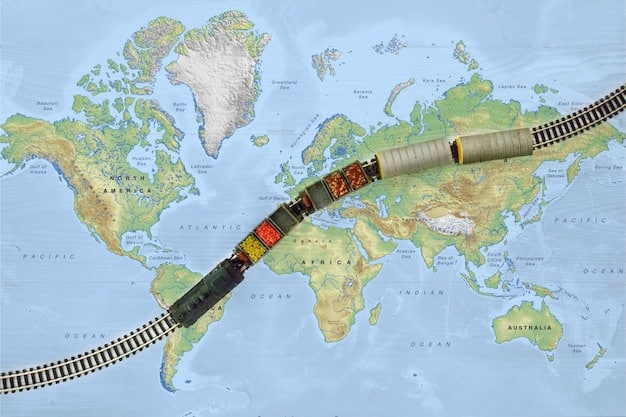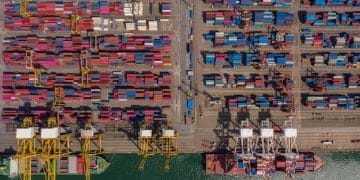US in Latin America: Navigating Challenges and Seizing Opportunities

The challenges and opportunities for the US in Latin America encompass economic, political, and social dimensions, requiring strategic engagement to foster stability, promote mutual prosperity, and counter external influences.
The relationship between the United States and Latin America is complex, marked by historical ties, economic interdependence, and shared geopolitical interests. Understanding the **challenges and opportunities for the US in Latin America** is crucial for shaping effective foreign policy and promoting regional stability.
The Shifting Geopolitical Landscape
The geopolitical landscape in Latin America is constantly evolving, presenting new challenges and opportunities for the United States. Factors such as the rise of China, internal political instability, and transnational threats are reshaping the region’s dynamics.
The Rise of China’s Influence
China’s growing economic and political influence in Latin America is a significant challenge for the US. China’s trade and investment have deepened ties with many countries in the region, potentially diminishing US leverage.
Internal Political Instability
Many Latin American nations face internal political instability, characterized by social unrest, corruption, and weak institutions. This instability can create vacuums that external actors can exploit and hinder US efforts to promote democracy and stability.
- China’s Economic Prowess: China’s trade and investment deals provide Latin American countries with alternative sources of capital and markets.
- Political Alliances Shift: Some Latin American nations are forming closer political alliances with China, reducing their reliance on the US.
- Debt Diplomacy: China’s lending practices have raised concerns about debt sustainability in some Latin American countries.
Addressing these challenges requires the US to adopt a more proactive and nuanced approach, focusing on strengthening partnerships, promoting good governance, and countering malign influence.

Economic Opportunities and Challenges
The economic relationship between the US and Latin America is multifaceted. While it presents opportunities for mutual prosperity, it also comes with inherent challenges such as trade imbalances, investment risks, and economic inequality.
Trade and Investment
Trade and investment are key components of the US-Latin America economic relationship. Increased trade and investment flows can boost economic growth and create jobs in both regions but require fair and equitable agreements.
Economic Inequality
Economic inequality is a major challenge in Latin America, hindering inclusive growth and fueling social unrest. Addressing inequality requires comprehensive strategies focused on education, job creation, and social safety nets.
- Trade Agreements: Evaluate and renegotiate trade agreements to ensure they benefit both the US and Latin American economies.
- Investment Promotion: Encourage US companies to invest in Latin America, especially in sectors that promote sustainable development.
- Supply Chain Resilience: Diversify supply chains to reduce dependence on any single country or region.
Successfully navigating these economic dynamics requires a commitment to fair trade, responsible investment, and inclusive growth policies.
Security Concerns and Cooperation
Security issues pose common challenges for the US and Latin American countries. These range from transnational crime and drug trafficking to cybersecurity threats and natural disaster response, requiring strong cooperation.
Transnational Crime
Transnational criminal organizations operate extensively in Latin America, engaging in drug trafficking, human smuggling, and other illicit activities. Effective law enforcement and border security cooperation are essential to combat these threats.
Cybersecurity Threats
Cybersecurity threats are increasingly prevalent, targeting both governments and private sector entities. Strengthening cybersecurity infrastructure and capabilities is crucial for protecting critical infrastructure and sensitive data.
- Joint Training Exercises: Conduct joint military and law enforcement training exercises to enhance interoperability.
- Information Sharing: Strengthen intelligence and information sharing mechanisms to track and disrupt criminal networks.
- Cybersecurity Protocols: Develop and implement standardized cybersecurity protocols to protect critical infrastructure.
To effectively address these security challenges, the US needs to foster strong partnerships and provide targeted assistance to help Latin American countries build their security capabilities.

Promoting Democracy and Governance
Supporting democracy and good governance in Latin America is a long-standing goal of US foreign policy. Strengthening democratic institutions, promoting human rights, and combating corruption are essential for regional stability and prosperity.
Strengthening Democratic Institutions
Strengthening democratic institutions, such as legislatures, judiciaries, and electoral bodies, is crucial for ensuring accountability and the rule of law. Technical assistance and capacity-building programs can help improve the effectiveness of these institutions.
Human Rights and Civil Society
Protecting human rights and empowering civil society are essential for fostering a vibrant and inclusive society. Supporting human rights defenders and civil society organizations can promote democratic values and hold governments accountable.
- Judicial Reform: Support judicial reform initiatives to improve the efficiency, transparency, and impartiality of justice systems.
- Electoral Integrity: Provide technical assistance to strengthen electoral processes and ensure free and fair elections.
- Civil Society Support: Fund civil society organizations that advocate for human rights, transparency, and good governance.
A commitment to democracy and governance requires the US to engage constructively with Latin American governments and civil society, promoting reforms and holding governments accountable for their actions.
Cultural Exchange and Soft Power
Cultural exchange and soft power initiatives are important tools for strengthening US-Latin America relations. Programs such as educational exchanges, cultural diplomacy, and people-to-people engagement can foster mutual understanding and goodwill.
Educational Exchanges
Educational exchanges can promote academic collaboration and cross-cultural understanding. Increasing the number of US students studying in Latin America and vice versa can foster long-term relationships and mutual appreciation.
Cultural Diplomacy
Cultural diplomacy can showcase US values and promote a positive image of the country. Supporting cultural events, artistic collaborations, and media exchanges can help bridge cultural divides and build trust.
- Fulbright Scholarships: Expand Fulbright scholarships and other exchange programs to increase the number of students and scholars studying in each other’s countries.
- Cultural Centers: Support the establishment and operation of US cultural centers in Latin American cities to promote American culture and values.
- Media Partnerships: Encourage partnerships between US and Latin American media organizations to produce content that highlights shared values and common interests.
By leveraging its soft power, the US can create a more positive and cooperative environment for addressing shared challenges and pursuing common goals in Latin America.
Environmental Sustainability and Climate Change
Environmental sustainability and climate change are pressing challenges that require collaborative solutions. Latin America is particularly vulnerable to the impacts of climate change, making cooperation on environmental issues essential.
Climate Change Mitigation
Reducing greenhouse gas emissions and transitioning towards a low-carbon economy are crucial for mitigating climate change. Supporting renewable energy projects and promoting sustainable transportation can help Latin American countries reduce their carbon footprint.
Environmental Conservation
Protecting biodiversity and conserving natural resources are essential for environmental sustainability. Supporting conservation efforts, promoting sustainable agriculture, and combating deforestation can help preserve Latin America’s rich natural heritage.
- Renewable Energy Projects: Invest in renewable energy projects, such as solar, wind, and hydropower, to reduce reliance on fossil fuels.
- Sustainable Agriculture: Promote sustainable agricultural practices that reduce deforestation and protect biodiversity.
- Conservation Initiatives: Support conservation initiatives aimed at protecting critical ecosystems and endangered species.
Addressing environmental challenges requires a collaborative approach, with the US providing technical and financial assistance to support Latin American countries in their efforts to promote environmental sustainability and combat climate change.
| Key Point | Brief Description |
|---|---|
| 🇨🇳 China’s Influence | China’s economic and political expansion challenges US dominance. |
| 🤝 Security Cooperation | Joint efforts are needed against transnational crime and cyber threats. |
| 🌱 Environmental Issues | Climate change requires urgent, collaborative sustainability projects. |
| 🏛️ Democratic Support | Strengthening institutions and civil society fosters stability. |
Frequently Asked Questions
▼
Significant challenges include the rise of China’s influence, internal political instability, and ongoing security concerns such as transnational crime and cybersecurity threats.
▼
The US can promote economic growth by fostering fair trade agreements, encouraging responsible investments, and supporting policies focused on inclusive and sustainable development.
▼
Cultural exchanges are crucial for fostering mutual understanding and goodwill, which helps build stronger diplomatic relations and people-to-people connections between the US and Latin America.
▼
The US can support democracy by strengthening democratic institutions, protecting human rights, combating corruption, and empowering civil society organizations across the region.
▼
Both regions face significant environmental issues such as climate change, deforestation, and biodiversity loss, requiring joint projects for environment sustainability and conversation.
Conclusion
Addressing the **challenges and opportunities for the US in Latin America** requires a multifaceted approach that encompasses economic partnerships, security cooperation, promotion of democracy and good governance, cultural exchange, and collaborative efforts towards environmental sustainability. By adopting a strategic and nuanced engagement, the US can foster stronger relationships, promote regional stability, and advance mutual prosperity.





